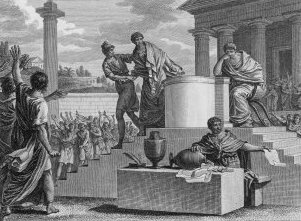When Tiberius Gracchus was elected as the representative of the Roman Senate in 133 B.C., nobody knew that the fall of the five hundred years old Roman Republic, which would inspire the European intellectuals and the American Constitution with its parliament and administration thousands of years later, will start and the Republic would turn into a dictatorship, the Roman Republic would come to an end and the Roman Empire would be founded. Tiberius suggested that some land of the rich Roman people were taken and distributed among the landless, and thus, he started the first land reform. The political rebellion he initiated would finish a republic and create a socialist concept that would influence the people for thousands of years. Tiberius was killed by the rich land owner senate members whose interests he threatened.
His full name is Tiberius Sempronius Gracchus, but we’ll call him as Tiberius here. He was born in 163 B.C., as the middle son of a significant politician and soldier, Tiberius Cracchus and African Cornealia. It is possible to define his family as quite rich and “noble”. Tiberius’s father, who had died when Tiberius was a small child, had a great deal of land.
To become elected again at the end of his one year of duty term, he promised to submit a draft regulation offering that the spoils of war brought from the Bergoamon Kingdom invaded by the Romans were used to finance the land reform, the duration of military service was shortened, the right of being a jury in courts which exclusively belonged to the senate members before, was given to everybody and the “foreigners” living in the land invaded and who did not have a citizenship right were accepted to be Roman citizens. If he was to be elected again, Tiberius’s reforms wouldn’t be limited to land reform. He promised democratization in other areas, as well.
There was an extraordinary tension in the senate on the day of the voting for Tiberius. One of the senators shouted that he wanted to be declared as the king. Havoc rose. Despite the presence of his supporters waiting out, Tiberius was beaten by the land owner conservative senators and killed. Upon his death, his brother Gaius followed his way and wanted to continue the reforms, but he was killed by the rich land owners just like his brother.
His full name is Tiberius Sempronius Gracchus, but we’ll call him as Tiberius here. He was born in 163 B.C., as the middle son of a significant politician and soldier, Tiberius Cracchus and African Cornealia. It is possible to define his family as quite rich and “noble”. Tiberius’s father, who had died when Tiberius was a small child, had a great deal of land.
Tiberius was a soldier like his father. He was sent to the Spanish front after his success in Carthage war. But things didn’t go well in Spanish front. The army was destroyed by the Spanish. He had two choices then. To fight and lose many people and withdraw or to save his army through a peace treaty and return back… He chose the second. He saved the lives of 20.000 soldiers. He signed a peace treaty and turned back to Rome. But his humanistic act was not approved, and he was expelled from the army on the grounds that the Roman Army would never sign a peace treaty with barbarians. Then, he entered politics.
When he was elected as the representative of the Senate in 133 B.C., he suggested that the public lands which were actually owned by the state but used by the rich senate members, were distributed among the poor within the framework of some rules (“Lex Sempronia Agragia”). This suggestion was accepted in the voting thanks to the support of the republican people party. The soldiers were also supporting Tiberius. Because when they went to military expeditions that lasted for long years, they found their lands invaded by the rich land owners, and they became landless when they returned back to Italy. Tiberius’s law would make them land owners again. The law, which made the people very happy, was not welcomed by the land owner senators.
 |
Octavius being pulled down the rostrum by Tiberius
(Augustyne Mirys, 1760)
|
As the support of the common people behind Tiberius intensified day by day, the number of his enemies in the “State” increased. The senate was divided into two as the reformists leaded by Tiberius, and the conservatives leaded by Marcus Octavius. Tiberius succeeded in sending Octavius away from the head of the conservative party claiming that Octavius was hindering the senate by misusing the veto right. He did this in a senate meeting, in front of everybody, by using force. You can find a quite detailed description of this tragic and significant event, Octavius’s leaving the rostrum in tears, the rich senators behind him, in Greek historian Plutark’s book titled as “Lives”, where he wrote about Tiberius’s life.
 |
| Tiberius addressing to farmers |
 | |
|
The land reform trial attempted by Tiberius brought the end of the Roman Republic and Senate, which was still trying to manage such a great country that had reached an enormous size due to the colonies it had established and its extending policy and the great incomes of this country through the laws of a small city-state. The act started by Tiberius caused a common disturbance and an approximately one hundred years of civil war. Soldiers such as Cornelius Sulla and Julius Cesar terminated the senate with coups and finally, Gaius Julius Agustus announced the foundation of an empire that would last till 1453, and he had it irrevocably institutionalized.
Tiberius’s land reform brought about two important questions that would occupy the mind of humanity for the following two thousand years:


No comments:
Post a Comment